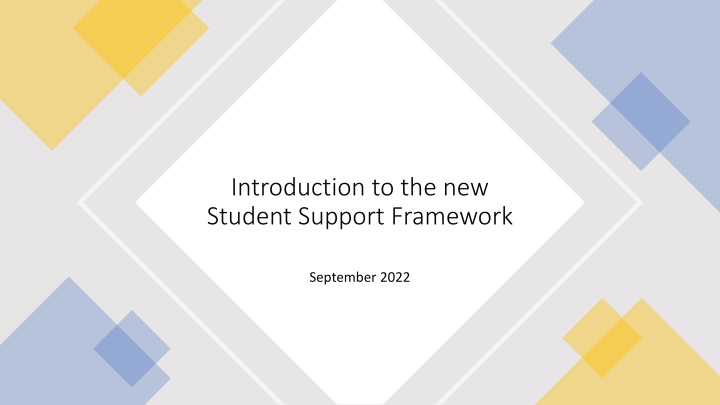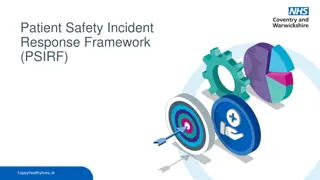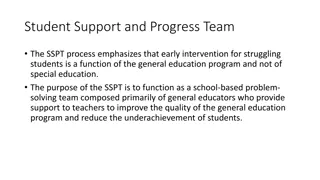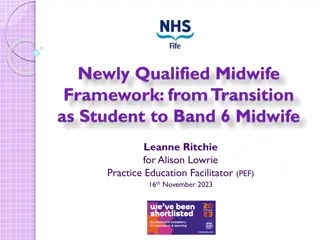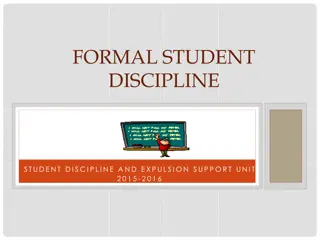Introduction to the new Student Support Framework
The new student support framework, introduced in September 2022, aims to provide inclusive support for various student groups by streamlining procedures and enhancing accessibility to support services. It covers areas such as extenuating circumstances policy, reasonable adjustments, support to study, and a single escalation and delegation framework for faculties and departments. The framework also includes provisions for short-term illness, disabilities, interruptions of study, academic adjustments, exam adjustments, and revamped processes for handling extenuating circumstances.
Download Presentation

Please find below an Image/Link to download the presentation.
The content on the website is provided AS IS for your information and personal use only. It may not be sold, licensed, or shared on other websites without obtaining consent from the author.If you encounter any issues during the download, it is possible that the publisher has removed the file from their server.
You are allowed to download the files provided on this website for personal or commercial use, subject to the condition that they are used lawfully. All files are the property of their respective owners.
The content on the website is provided AS IS for your information and personal use only. It may not be sold, licensed, or shared on other websites without obtaining consent from the author.
E N D
Presentation Transcript
Introduction to the new Student Support Framework September 2022
What we will cover today Background Overview of the Framework Extenuating Circumstances Policy Reasonable Adjustments Support to Study Extenuating Circumstances System
Background January 2020, a Student Support Review was established to revise UCL regulations and procedures relating to student support with a focus on ECs, SoRAs and Fitness to Study Covid-19 led to introduction of self-certified ECs Staff and Student surveys conducted regarding ECs and SoRAs Project further delayed due to Covid-19 and refreshed in the autumn of 2021 Steering Group and Task Groups created, including PS, Academic, SU, and Academic Board Members Draft discussed at FT Forum, ARQASC, QRSC, EdCom Academic and Equality Impact Assessments complete Approved by ARQASC & EdCom
Aims Inclusive framework to support different student groups Support students and student facing staff Help students and staff more easily navigate support available Comprehensive reference point for PTs, SAs, other faculty/departmental and Central staff Simplify and streamline
Framework Overview Short-term illness and other Extenuating Circumstances Reasonable Adjustments for disabilities and long-term conditions Interruption of Study* Student Support Framework Support to Study Procedure Academic Adjustments Exam Adjustments*
Single escalation and delegation framework for all faculties/ departments, including mandatory Departmental EC Panels Self-certification permanently included in UCL regulations Removal of separate 1 week extension process Single list of standard mitigations for assessment type and approval levels Refreshed guidance on valid grounds for Extenuating Circumstances Revised policies on late evidence and late ECs Revised process for requesting a review of a decision Streamlined process supported by new online workflow in Portico Extenuating Circumstances Policy
Late ECs & Appeals EC Claims should normally be submitted within a week, with panel flexibility up until results release Evidence must be submitted within 4 weeks of the claim Late ECs post-formal results will now be considered as an Academic Appeal Students can request a review of an EC decision based on procedural error: DECP to FECP, FECP to Academic Services
EC Categories: Self Certified & Evidenced Assessment Type Recommended Mitigation Minimum Approval Level Departmental Extenuating Circumstanc es Panel Evidence Requirements Controlled Condition Exam Deferral without Tuition to the next normal occasion (typically the Late Summer Assessment Period). Extension of 2 hours per 24-hour period (e.g. a 48-hour paper would be extended by 4 hours). Deferral without Tuition to the next normal occasion (timing determined by the department). Deferral without Tuition (timing determined by the department). Extension of up to 2 weeks (10 working days). Std can self-certify within specified conditions see Section 2.7: Self- Certification. CATEGORY 1: Self-Certified Mitigations Take-home paper (including 24- hour assessments) Quizzes & In-class tests Practical exam Dissertation/ research project If you do not meet the self-certification criteria, evidence is required. Evidence Requirements Coursework and other assessments Extension of up to 1 week (5 working days). Assessment Type Recommended Mitigation Minimum Approval Level Departmental Extenuating Circumstanc es Panel As appropriate Suspension of the Late Submission Penalties. Coursework extension longer than 1 week. Dissertation/ research project extension longer than 2 weeks. Deferral without Tuition: Not at the next normal occasion. Deferral without Tuition for assessments immediately prior to a period of Interruption. Deferral with Tuition. Deferral with Tuition for lectures, seminars, tutorials, supervision or other teaching events immediately prior to a period of Interruption. Evidence required CATEGORY 2: Evidenced Mitigations Exclude component from module calculation: Maximum 10% weighting.
EC Categories: Exceptional & Extraordinary Assessment Type Recommended Mitigation Minimum Approval Level Faculty Extenuating Circumstanc es Panel Evidence Requirements As appropriate Extension longer than 12 weeks. Alternative Method of Assessment allowing the student to demonstrate achievement of the same learning outcomes (subject to consultation with the Programme Leader and approval by the External Examiner). Exclude component from module calculation: 11 to 50% weighting. Evidence required CATEGORY 3: Exceptional Mitigations Exclude module from Progression/ Award Requirements: Maximum 30 credits. Exclude module from Classification calculation: Maximum 30 credits. Exclude module from Progression/ Award Requirements and Classification calculation: Maximum 30 credits. Transfer to Part-Time study (UG and PGT students), or Flexible- Modular study (PGT students only) where possible in the curriculum. Recommended Mitigation Assessment Type Minimum Approval Level Director of Academic Services on behalf of the Vice-Provost (Education and Student Experience) Evidence Requirements As appropriate Exclude component from module calculation: More than 50% weighting. Exclude module from Progression/ Award Requirements: More than 30 credits. Exclude module from Classification calculation: More than 30 credits. Exclude module from Progression/ Award Requirements and Classification calculation: More than 30 credits. Any Suspension of Regulations or mitigation not included in this list. Evidence required CATEGORY 4: Extraordinary Mitigations
EC Categories: Panels and Decisions Each UCL faculty must have a faculty extenuating circumstances panel (FECP) which oversees decision- making for all EC claims submitted by students in the departments under the faculty s remit. Each UCL department must have a departmental extenuating circumstances panel (DECP) however department may cover local variations such as divisions, institutes, short course providers etc. While panels are responsible for all decisions, the administration of claims may be carried out by appropriate academic and/ or professional services staff under the supervision of the panel chair and deputy chair. This may include approval of self-certified claims that meet all of the relevant criteria. Any uncertain or edge cases should be considered by the full panel. The mitigation table provides a recommended mitigation, not a compulsory mitigation. Students who may be eligible to submit a self- certified claim are still permitted to submit evidence.
Updated and modernised better alignment with the Equality Act (2010) incorporating new guidance on the types of adjustments available for different conditions. New Service Level Agreements to enhance the student experience. Two key operational changes to improve operation of SoRAs: Departmental SoRA contacts to support and manage SoRA s Departmental SoRA Statements a short resource sheet summarising learning, teaching and assessment activities in the subject area and highlighting any special discipline-specific conditions such as professional accreditation. SSW will have a better understanding of the local context. Reasonable Adjustments for disabilities and long- term conditions
Academic Adjustments Simply creating transparent signposting to the support already available via departments Often informal arrangements related to teaching Ongoing support for protected characteristics, and other circumstances including: Students who have parenting or caring responsibilities Students who are pregnant Students planning maternity, paternity, parental and adoption leave Students who observe religious beliefs or cultural customs Students affected by any form of harassment or discrimination Students affected by traumatic world events such as war or terrorism Students who are critical workers (e.g. NHS staff). Filling the gap for long-term support where Extenuating Circumstances aren t appropriate Explains the types of support available and when certain things aren t possible
Support to Study Replaces current procedures for Fitness to Study Does not technically replace Learning Agreements, but we encourage use to Support Plans More supportive, inclusive and holistic approach for students who are having persistent, long-term, significant difficulties and where UCL s normal mechanisms (ECs, SoRAs etc.) are not providing the right level of support Two stage process: 1. Support Plan - tailored package of staff and student actions, and recommendations for support e.g. student is encouraged to apply for ECs, a SoRA, an interruption, a programme transfer 2. If a Support Plan isn t able to provide the right level of support, referral to a central Support to Study Panel which can mandate certain types of support e.g. additional adjustments, mandatory deferral, mandatory repeat, mandatory interruption, mandatory programme transfer, mandatory withdrawal
Other Changes Minor updates to Exam Adjustments and Interruptions Minor updates to align the language with the rest of the new framework. Revised policy on acute episodes and fluctuating conditions Revised policy on the overlap between SoRA s and EC s. SSW and Departmental SoRA contacts to work together to consider student s needs. Updated policy on supporting evidence Single policy on providing supporting evidence. New policy on confidentiality and GDPR Overarching policy to explain student privacy issues in relation to UCL s key support process. Updated policy on which regulations apply to which students Overarching policy to explain when UCL s regulations apply. Outlines where responsibilities lie for interdepartmental modules.
Examples: Isaac observes Shabbat but has teaching on a Friday afternoon for two modules; one tutorial, one lecture, for different modules. They ve asked if the times for these can be rearranged. There are other tutorial groups on Thursday which don t clash, but no alternative lectures. Beth has a SoRA for depression. They have historically also used ECs to seek additional extensions and deferrals. Their attendance is very poor and often comes forward with ECs late in the year. Zhang has told you they have just received a diagnosis for a specific learning difference (SpLD). They don t have a SoRA in place, but they have a deadline coming up which they are struggling to meet. Process: SoRA Process: Support to Study Process: Academic Adjustment Suggested steps: Liaise with your Departmental SoRA contact (DSC) or SSW to put a SoRA in place. If it is not possible to put a SoRA in place in time, then the DSC should work with SSW to establish if appropriate temporary adjustments can be put in place. Students shouldn t normally need to submit separate EC for a temporary adjustment in these situation. Suggested steps: Establish a new support plan which includes a review of the SoRA with the support of the SoRA contact. Consider other suitable academic adjustments and/or ECs whilst also setting clear academic expectations. If the revised support plan is ineffective, escalate to a support to study panel. Suggested steps: If possible, swap their tutorial group. Explore possibilities how they might engage with the lecture asynchronously, and ways to ensure they meet minimum attendance requirements.
Our new Portico EC System Our new Portico EC System Kirsten Hamilton Head of Portico Engagement
Introducing our new Portico EC System Introducing our new Portico EC System New system will be live for students to use from 3 October 2022 Previous systems phased out from go live dependent on Faculty considerations All UCL students will submit EC claims via the new system in Portico We have worked closely with our EC Working Group made up of reps from across UCL to shape the system and respond to feedback Testing has been successful with positive feedback received from staff Town Hall was attended 400 people earlier this week Updating student and staff EC webpages (Training materials, User Guides, FAQs)
Benefits for students Benefits for students A simplified, straight-forward request process More equitable decisions due to greater standardisation Easier process as minimal data input required - all personal, programme, module and assessment data is in SITS Improved response times and reduction in lost requests Greater transparency and support - students can login to the portal and check status of requests To improve student satisfaction and student experience Improved student service if process is joined up with other related processes (interruptions, SORA)
Benefits for staff Benefits for staff Less time-consuming and resource intensive for staff Fewer data errors from applications - all information stored in one place, automating updating of decisions and communications will save staff time Improved EC transparency will enable UCL to better adhere to academic policies Only giving staff access to required information improves GDPR compliance UCL STAFF BENEFITS Improve data quality will expedite the process for students and staff All requests and decisions in one place will save staff time and reduce the risk of not complying with an EC decision
Key aspects of the new system Key aspects of the new system Students will submit EC claims according to their student record on Portico They will select mitigations relevant to assessment type Self certification rules are built into the system students can only self certify twice Decisions on ECs will be visible on Portico Students will receive an email asking them to log in to Portico to find out the outcome of their claim Links to relevant regulations will be included in student emails Please be mindful that when a decision is made it will be sent immediately to student - consider working hours Faculty and Departmental panels are being given access to the new system Reporting on all claims will be available for different roles involved in Ecs Panel members will be notified about outstanding claims
Student View Student View How it will work for our students
1. Student logs into Portico and submits an EC claim 1. Student logs into Portico and submits an EC claim
2. Student selects their affected assessment 2. Student selects their affected assessment and mitigation sought . and mitigation sought .
3. Student enters a summary of their circumstances 3. Student enters a summary of their circumstances
4 4. . Students Students can choose to can choose to self self- -certify if eligible: certify if eligible: Or Upload Or Upload Evidence as Evidence as Required: Required:
5 5. Student is notified of the outcome . Student is notified of the outcome once a Panel has recorded a decision. a decision. once a Panel has recorded View of a successful claim
5 5. Student is notified of the outcome... . Student is notified of the outcome...
Staff View Staff View How it will work for you
EC Panels EC Panels We are working with Faculties to set up the EC Faculty Panels The DECP must be constituted as follows: The DECP should be chaired by the Departmental Tutor. A Deputy Chair must be nominated to stand in for the Chair where necessary. In addition to the Chair and Deputy Chair, the DECP must include at least two members of senior Departmental staff such as Programme Leaders, Departmental Tutors (or equivalent) and senior Professional Services staff While Panels are responsible for all decisions, the administration of claims may be carried out by appropriate academic and/ or professional services staff under the supervision of the Panel Chair and Deputy Chair. This may include approval of self-certified claims that meet all of the relevant criteria. Any uncertain or edge cases should be considered by the full Panel.
Staff on EC Panels can view all claims Staff on EC Panels can view all claims Staff on EC Panels can filter claims by Staff on EC Panels can filter claims by criteria, dates, and via the search criteria, dates, and via the search function: function:
Consider the EC claim based on info provided Consider the EC claim based on info provided EC Details overview of the claim and student details Assessment - see which assessments the student is seeking mitigation for Evidence - view the details of the evidence provided by the student Panel Discussion - If you wish to share internal comments with colleagues on the EC Panel Student comms make a note of anything you wish to tell the student EC History You can see any other claims that the student has submitted
Making decisions Making decisions
Sharing decision with students Sharing decision with students Consider the Notes for Student field Important to remember that students will see this text What is helpful for the student to see Can you provide any weblinks or further information?
Visibility of ECs for staff Visibility of ECs for staff Members of EC Panels will get a daily notification - a summary of all EC claims in progress Reports can be run by departmental staff containing relevant information about EC decisions Departments can choose to add a generic inbox (e.g. greekandlatinECs@ucl.ac.uk to have notifications from Portico when decisions are made
Next Steps Next Steps Support for go-live drop-in sessions, user guides and FAQs for staff and students Webpages We are updating the central EC webpages for staff and students Please review your local Faculty/Department webpage guidance for ECs and ensure all webpages direct students to our central EC webpage
